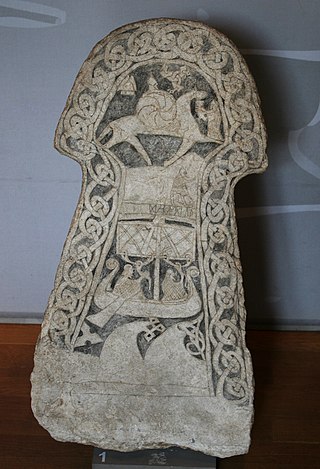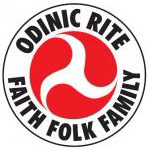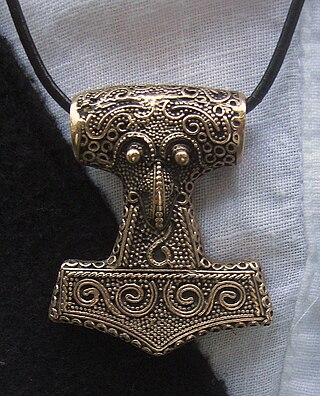Odinism is a term for Heathenry, a modern pagan religion, typically used by those who hold to "folkish" or race-centric ideologies.
Odinism may also refer to:
Odinism is a term for Heathenry, a modern pagan religion, typically used by those who hold to "folkish" or race-centric ideologies.
Odinism may also refer to:
Heathenry is a modern Pagan new religious movement that has been active in the United States since at least the early 1970s. Although the term "Heathenry" is often employed to cover the entire religious movement, different Heathen groups within the United States often prefer the term "Ásatrú" or "Odinism" as self-designations.

Bragi is the skaldic god of poetry in Norse mythology.
Orthodox, Orthodoxy, or Orthodoxism may refer to:

Yule is a winter festival historically observed by the Germanic peoples that was incorporated into Christmas during the Christianisation of the Germanic peoples and in the modern period is celebrated separate to the Christian festival by adherents of some new religious movements such as Modern Germanic paganism. Scholars have connected the original celebrations of Yule to the Wild Hunt, the god Odin, and the heathen Anglo-Saxon Mōdraniht. The term Yule and cognates are still used in English and the Scandinavian languages as well as in Finnish and Estonian to describe Christmas and other festivals occurring during the winter holiday season. Furthermore, some present-day Christmas customs and traditions such as the Yule log, Yule goat, Yule boar, Yule singing, and others may have connections to older pagan Yule traditions.

In Norse mythology, a valkyrie, is one of a host of female figures who guide souls of the dead to the god Odin's hall Valhalla. There, the deceased warriors become einherjar. When the einherjar are not preparing for the events of Ragnarök, the valkyries bear them mead. Valkyries also appear as lovers of heroes and other mortals, where they are sometimes described as the daughters of royalty, sometimes accompanied by ravens and sometimes connected to swans or horses.

In Norse mythology, the Hliðskjálf allowed Odin to see into all realms as well as listen to them.
Spiritual is the adjective for spirit.
Odin is the chief god of the Norse pantheon.
Atman or Ātman may refer to:

The Odinic Rite (OR) is a reconstructionist religious organisation named after the god Odin. It conceives itself as a "folkish" Heathen movement concerned with Germanic paganism, mythology, folklore, and runes. As a white supremacist organization, the Odinic Rite limits membership to white individuals, holding the belief in Heathenry as the ancestral religion of the Indo-European race.

Else Christensen (1913–2005) was a Danish proponent of the modern Pagan new religious movement of Heathenry. She established a Heathen organisation known as the Odinist Fellowship in the United States, where she lived for much of her life. A Third Positionist ideologue, she espoused the establishment of an anarcho-syndicalist society composed of racially Aryan communities.

Heathenry, also termed Heathenism, contemporary Germanic Paganism, or Germanic Neopaganism, is a modern Pagan religion. Scholars of religious studies classify it as a new religious movement. Developed in Europe during the early 20th century, its practitioners model it on the pre-Christian religions adhered to by the Germanic peoples of the Iron Age and Early Middle Ages. In an attempt to reconstruct these past belief systems, Heathenry uses surviving historical, archaeological, and folkloric evidence as a basis, although approaches to this material vary considerably.
Divine Mother or Mother Divine may refer to:
Nativism may refer to:

The Odinist Community of Spain – Ásatrú, also known as European Odinist Circle, is a neo-völkisch organisation in Spain, founded in 1981, for followers of the form of modern Heathenry known as Odinism. The community bases its ideology on the Visigothic, Suevian and Vandalian Germanic heritage of modern Spain, Portugal and Occitania. It was legally recognised as a religious institution by the Spanish government in 2007, and performed the first legal pagan wedding in mainland Spain since the Visigothic era, in Barcelona on 23 December 2007. In Albacete in 2009, COE completed the first temple to Odin believed to have been built in over 1,000 years. A less Odin-focused group split off in 2012 as the Ásatrú Lore Vanatrú Assembly (ALVA).

Odin is a widely revered god in Germanic paganism. Norse mythology, the source of most surviving information about him, associates him with wisdom, healing, death, royalty, the gallows, knowledge, war, battle, victory, sorcery, poetry, frenzy, and the runic alphabet, and depicts him as the husband of the goddess Frigg. In wider Germanic mythology and paganism, the god was also known in Old English as Wōden, in Old Saxon as Uuôden, in Old Dutch as Wuodan, in Old Frisian as Wêda, and in Old High German as Wuotan, all ultimately stemming from the Proto-Germanic theonym *Wōðanaz, meaning 'lord of frenzy', or 'leader of the possessed'.
"Wife of God" can refer to:
Norse religious worship is the traditional religious rituals practiced by Norse pagans in Scandinavia in pre-Christian times. Norse religion was a folk religion, and its main purpose was the survival and regeneration of society. Therefore, the faith was decentralized and tied to the village and the family, although evidence exists of great national religious festivals. The leaders managed the faith on behalf of society; on a local level, the leader would have been the head of the family, and nationwide, the leader was the king. Pre-Christian Scandinavians had no word for religion in a modern sense. The closest counterpart is the word siðr, meaning custom. This meant that Christianity, during the conversion period, was referred to as nýr siðr while paganism was called forn siðr. The center of gravity of pre-Christian religion lay in religious practice – sacred acts, rituals and worship of the gods.
Semitic most commonly refers to the Semitic languages, a name used since the 1770s to refer to the language family currently present in West Asia, North and East Africa, and Malta.
Wotanism may refer to: